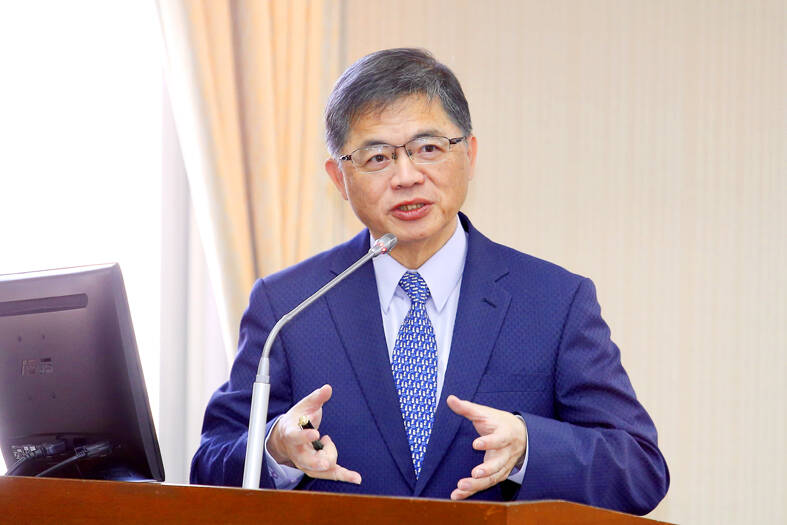The petrochemical, machine tool and steel sectors would likely be the hardest hit if China were to terminate the Economic Cooperation Framework Agreement (ECFA) or some of the early harvest lists, Executive Yuan Secretary-General Li Men-yen (李孟諺) told a meeting of the Legislative Yuan’s Internal Administration Committee yesterday.
Li’s comments came in the wake of remarks by the Chinese Ministry of Commerce that it is looking to terminate the ECFA in full or rescind some of the preferential tax rates for Taiwanese products.
Democratic Progressive Party (DPP) Legislator Chuang Jui-hsiung (莊瑞雄) asked how the government intended to respond to China setting the date to announce the results of a probe into whether Taiwan’s trade policies constitute a trade barrier one day before the legislative and presidential elections in January.

Photo: George Tsorng, Taipei Times
The government should assist Taiwanese businesspeople as it begins to reduce its reliance on Chinese trade, Chuang said.
The government has been diversifying its market over the past few years, with trade volume to countries under the New Southbound Policy doubling, while exports to China have dropped from 43 percent to 35 percent, Li said.
Fruit exports to China have dropped to 10 percent from 80 percent, he said.
China’s petrochemical industry is in full production, which could result in a situation similar to what the solar panel industry is facing, he said.
Solar panel producers have been affected by China’s actions in the past few years, he said, citing South Korea’s import surplus over the past two years.
The Ministry of Economic Affairs has worked hard to hold talks with affected industries, and the government can assist the sectors to diversify their markets while increasing production quotas, Li said.
Measures include creating niche products, such as smart products or products and services that would decrease carbon emissions, he said.
Chuang said that “China is no fool” and would weaponize the economy in response to Taiwan’s attempts to mitigate risks and exit the Chinese market.
China could restrict Taiwanese businesspeople from leaving the country, or detain them, he said.
The government should warnTaiwanese businesspeople in China and expand its efforts to provide humanitarian aid, he added.
Li said that Taiwanese businesspeople in China should be aware that Beijing is capable of “disappearing” Chinese citizens, even Alibaba Group Holding Ltd founder Jack Ma (馬雲), and imposing restrictions and auditing them.
Taiwanese in China must be on high alert, he added.

A Taiwanese software developer has created a generative artificial intelligence (AI) model to help people use AI without exposing sensitive data, project head Huang Chung-hsiao (黃崇校) said yesterday. Huang, a 55-year-old coder leading a US-based team, said that concerns over data privacy and security in popular generative AIs such as ChatGPT and DeepSeek motivated him to develop a personal AI assistant named “Mei.” One of the biggest security flaws with cloud-based algorithms is that users are required to hand over personal information to access the service, giving developers the opportunity to mine user data, he said. For this reason, many government agencies and

The National Fire Agency on Thursday said a series of drills simulating a magnitude 8.5 earthquake would be held in September to enhance the government’s emergency response capabilities. Since earthquakes cannot be predicted, only by continuously promoting disaster prevention measures could Taiwan enhance its resilience to earthquakes, agency Director-General Hsiao Huan-chang (蕭煥章) said in a news release. The exercises would be held to mark annual National Disaster Prevention Day on Sept. 21, the aim of which is to test Taiwan’s preparedness and improve its earthquake resilience in case of a major temblor, Hsiao said. As part of those drills, an earthquake alert would

DEFENSE: The National Security Bureau promised to expand communication and intelligence cooperation with global partners and enhance its strategic analytical skills China has not only increased military exercises and “gray zone” tactics against Taiwan this year, but also continues to recruit military personnel for espionage, the National Security Bureau (NSB) said yesterday in a report to the Legislative Yuan. The bureau submitted the report ahead of NSB Director-General Tsai Ming-yen’s (蔡明彥) appearance before the Foreign and National Defense Committee today. Last year, the Chinese People’s Liberation Army (PLA) conducted “Joint Sword-2024A and B” military exercises targeting Taiwan and carried out 40 combat readiness patrols, the bureau said. In addition, Chinese military aircraft entered Taiwan’s airspace 3,070 times last year, up about

STRICTER ENFORCEMENT: Taipei authorities warned against drunk cycling after a sharp rise in riding under the influence, urging greater public awareness of its illegality Taipei authorities have issued a public warning urging people not to ride bicycles after consuming alcohol, following a sharp rise in riding under the influence (DUI) cases involving bicycles. Five hundred and seven people were charged with DUI last year while riding YouBikes, personal bicycles, or other self-propelled two-wheelers — a fourfold increase from the previous year, data released by the Taipei Police Department’s Traffic Division showed. Of these, 33 cases were considered severe enough to be prosecuted under “offenses against public safety,” the data showed. Under the Road Traffic Management and Penalty Act (道路交通管理處罰條例), bicycles — including YouBikes and other